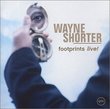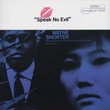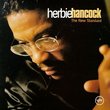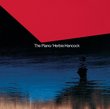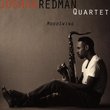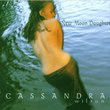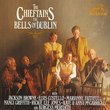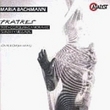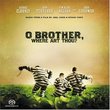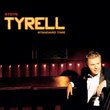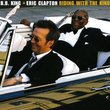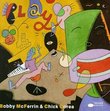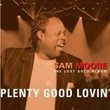| All Artists: Herbie Hancock, Wayne Shorter Title: 1+1 Members Wishing: 0 Total Copies: 0 Label: Polygram Records Original Release Date: 7/1/1997 Release Date: 7/1/1997 Genres: Jazz, Pop, R&B Styles: Avant Garde & Free Jazz, Jazz Fusion, Modern Postbebop, Bebop, Funk Number of Discs: 1 SwapaCD Credits: 1 UPC: 731453756427 |
Search - Herbie Hancock, Wayne Shorter :: 1+1
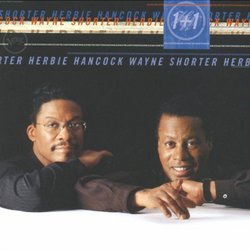 | Herbie Hancock, Wayne Shorter 1+1 Genres: Jazz, Pop, R&B
On this remarkably intimate session, Herbie Hancock and Wayne Shorter reduce themselves to their purest instrumental voices, Hancock's piano and Shorter's soprano sax. In some way the improvisatory character is a return to... more » |
Larger Image |
CD DetailsSynopsis
Amazon.com essential recording On this remarkably intimate session, Herbie Hancock and Wayne Shorter reduce themselves to their purest instrumental voices, Hancock's piano and Shorter's soprano sax. In some way the improvisatory character is a return to their musical roots, eschewing the techno-grooves and layered sounds of their most successful commercial ventures. For Hancock it's a return to the spontaneity of the duets with Chick Corea, while for Shorter it's akin to the recording with Jim Hall and Michel Petrucciani. Either way, it's one of the most arresting dates of their later careers, a work of creative introspection and retrospection, two artists turning to a pivotal partner for inspiration. Whether the music is wistful or unsettling, it's the subtlety--almost the minimalism--that's most startling, a mature knowledge that you can sometimes make the most with the least. --Stuart Broomer Similar CDs
Similarly Requested CDs
|
CD ReviewsWarning: Active Listening Required Sor_Fingers | Boulder, CO USA | 06/06/2006 (5 out of 5 stars) "This album is a real manifest of brilliance, two geniuses in the studio collaborating. The music is free, liquid and liberal. There is not much form, nor is there much planning. This album is mostly free jazz and I am pretty sure that much of the people who rated this recording low were probably not very appreciative of free jazz in general. Because this album is not as musically simple or structured as something like "Kind of Blue," it really requires a different listening style than most music in the mainstream. You wouldn't listen to this album in the same way that you would listen to "Kind of Blue" just as you wouldn't read Salman Rushdie the same way you would read Hemmingway. This album really requires the listener's brain to be completely engaged. Though there is much to analyze on all jazz records, many can be put on as background music and the sounds can be enjoyed and appreciated passively. That is not the case with this disc. The listener can only really appreciate this album by getting into the mindset of Hancock and Shorter and trying to figure out what exactly is going on. What the listener can discover besides the fact that both are incredible players with an incredible technical mastery of their instruments, is that this album is essentially four golden ears at work. The two players are constantly in eachother's heads. Rarely is either player soloing, instead, the two players are creating an intricate dialog of sound, chords, melodies and rhythm that requires the use of the amazing ears each player has. They make the sparse setting of piano and saxophone not just work, but engulf you. I have to disagree with reviewers who claim this album lacks emotion, shape or inspiration. I just don't understand how that accusation can be made. Listen to the brilliance, engage your brain and try to dissect the dialog Shorter and Hancock compose. The only thing simple about this album is the title. Everything else is going to require a little bit more engagement. If you are willing to take on that task, more power to you." When it works, it works...but inconsistent Clinton Smith | New York City | 03/28/2006 (3 out of 5 stars) ""1+1" doesn't sound like much of anything else from the recorded output of either of these artists, either from their earlier post-bop/modal jazz eras, or the fusion music that both of them played, and, then, much later, the sort of "fusion lite" that gave fusion a bad name. Despite the large amounts of empty space that a saxophone/piano duet promises, neither Hancock nor Shorter seems daunted, or tempted to overplay in a fashion that a younger player might approach this space. Many of the pieces are slow, ruminative, but not particularly brooding; atonal slightly here and there, but never really peering that far over the precipice. There's a feeling that, if Hancock and Shorter were going to make an album that doesn't have a particular "jazz" sound to it, perhaps they should have tried something a little more adventurous than this. The ponderous, repeated, vaguely modern-classical overtones of Hancock's playing on "Meridianne" sound much better on the records of the classical musicians who influence Hancock. "Aung Sang Suu Kyi" sounds like riff-based blues, only without a riff and without any blues. The stretch of tracks from 3-7 are probably the strongest on the records... Shorter's playing veers between moments of beauty and what could only be described as eccentric; overly concerned with the higher end of the horn and long notes without any melodic development or flow on the weaker material, yet playing some repeating motifs on songs such as "Sonrisa" that are truly beautiful and moving. That being said, he sounds a bit like he's playing outside of his style, although it could be pointed out that Ornette Coleman's playing has evolved in a similar fashion through the ensuing decades; more exploring timbres, space, the implications of a single note or repeated note, rather than playing flurries of quicker notes through changes. Listen to the Shorter of "Super Nova" and this one, and it's not even clear it's the same player. So, really, about 4 or 5 good tracks-"Sonrisa", "Memory of Enchantment", "Diana", perhaps "Manhattan Lorelei" (the music seems to sound more close to what one would consider typical jazz duets as one continues to listen). Both Hancock and Shorter have much better records that should be considered first; however, you could turn to this one to check out what each player does without the net of a rhythm section, or the comfort of really well-defined charts and boundaries (some of the songs are quite hard to reduce in your mind to the melody-solos format, which is on one hand great, but on the other hand...where's the song?)." Isolative yet Intimate Cameron | Brisbane AUSTRALIA | 07/12/2007 (4 out of 5 stars) "It's a little hard to define this album. Herbie Hancock and Wayne Shorter are two of the world's great jazz musicians, establishing themselves in the 1960s, both of them deviating from acoustic 'true' jazz and moved into Funk and Fusion in the 70s/80s. They have resurfaced in recent years with a return to jazz that their earlier fans love, so one would expect this collaboration to be the jazz album of the decade.
I would have loved to hear these two collaborate on a body of work, perhaps Modal in nature, with touches of Funk and Fusion if they could have done so without sounding dated. This is not the sound I heard when I put this disc in rotation, but after I got over my initial expectations I found that this is an intriging album to have in my collection. This is quite a moving album, and yes it is jazz; but it is not the free expression jazz, or even modal jazz that I anticipated, but rather a body of material that is almost baroque in nature at times, having more than a passing nod to Classical music. I come away with an intersting mood after investing myself in this album, one of isolation yet intimacy. Needless to say, casual listeners may find this album tedious at times, but the astute listeners will find this material very interesting and absorbing. I recommend this album for those who fall into the second group, as no doubt this album will end up being a little treasure in your collection. " |

 Track Listings (10) - Disc #1
Track Listings (10) - Disc #1